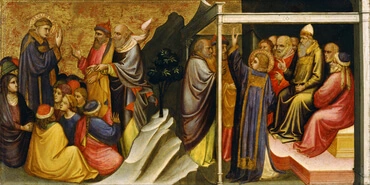7996. 'No son of a foreigner shall eat it' means that those not in possession of truth and good are set apart from them. This is clear from the meaning of 'a foreigner' as those who are outside the Church and unreceptive of anything of the truth or good of faith, as the nations in the land of Canaan were, dealt with in 2049, 2115, thus those who are not in possession of truth and good; and from the meaning of 'not eating it' as not having any contact with them or being joined to them, thus being set apart from them. The verses immediately following deal with those who shall eat the Passover together and those who shall not eat it. The Passover was a supper, representing the groups of good people living in association with one another in heaven. The statutes in the verses that follow indicate who exactly could be included and who could not. In general the banquets within the Church in ancient times, both midday meals and suppers, were held in order that people might be brought into association with one another and joined together in love, and in order that they might inform one another about matters of love and faith, and so about the things of heaven, see 3596, 3832, 5161. Such were the delights surrounding feasts in those times, and they were the end in view in holding midday meals and suppers. People's minds were thereby nourished, and also their bodies in a parallel and corresponding way. As a result they enjoyed good health and long life, they received intelligence and wisdom, and they were also brought into communication with heaven, some into open communication with angels. But as in course of time all internal things disappear and give way to external ones, so it is with the ends to which banquets and feasts are held. At the present day these are held not to draw people together into any spiritual fellowship but to create worldly connections. That is to say, they are held for the sake of material gain, the quest for high office, and mere pleasures. They provide nourishment for the body, but none for the mind.







